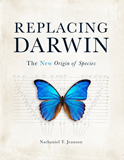
Darwin’s Propagation of Evolution
Creationists have occasionally pointed out that Charles Darwin wasn’t uniquely responsible for inventing the theory of evolution—not to belittle the British scientist, but rather to encourage a better understanding of the history of the idea.
News Source
Evolutionary biologist Ned Friedman, the new director of Harvard University’s Arnold Arboretum, discussed some of the history of evolutionary thought at a recent talk kicking off a new lecture series at the arboretum. In his talk, titled “A Darwinian Look at Darwin’s Evolutionist Ancestors,” Friedman argued that Darwin’s most prominent contribution was in popularizing the idea of evolution by making it more readable—and thereby “revolutionary.”
Darwin himself was forced to acknowledge other progenitors of evolutionary theory in a section of later printings of On the Origin of Species, Friedman explained. By the sixth edition, some thirty-four other individuals were mentioned; according to Friedman, historians now believe that as many as sixty other thinkers preceded Darwin in writing about evolution. This included Darwin’s own grandfather, Erasmus Darwin.
What set Darwin and contemporary Alfred Russel Wallace apart from most was their emphasis on and exposition of natural selection as the mechanism driving evolution. But Darwin was uniquely capable and driven to “convince others of the correctness of the idea,” Friedman said.
For natural selection to drive the sort of progressive, “mollusks to man” evolution that Darwin envisioned, organisms must be capable of generating complex new anatomical features through natural processes, such as through genetic mutations.
In fact, understanding natural selection and biological evolution as separate ideas—closely related in many ways, but ultimately distinct—is crucial for properly understanding modern creationists’ biological models. For natural selection to drive the sort of progressive, “mollusks to man” evolution that Darwin envisioned, organisms must be capable of generating complex new anatomical features through natural processes, such as through genetic mutations. Without this capability, “evolution” can only proceed in a horizontal or downward direction, resulting in new species that are no more complex than their ancestors—and undermining the Darwinian narrative of life’s history.
Further Reading
For More Information: Get Answers
Remember, if you see a news story that might merit some attention, let us know about it! (Note: if the story originates from the Associated Press, FOX News, MSNBC, the New York Times, or another major national media outlet, we will most likely have already heard about it.) And thanks to all of our readers who have submitted great news tips to us. If you didn’t catch all the latest News to Know, why not take a look to see what you’ve missed?
(Please note that links will take you directly to the source. Answers in Genesis is not responsible for content on the websites to which we refer. For more information, please see our Privacy Policy.)
Recommended Resources

Answers in Genesis is an apologetics ministry, dedicated to helping Christians defend their faith and proclaim the good news of Jesus Christ.
- Customer Service 800.778.3390
- Available Monday–Friday | 9 AM–5 PM ET
- © 2026 Answers in Genesis




